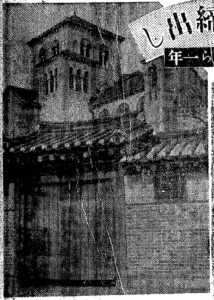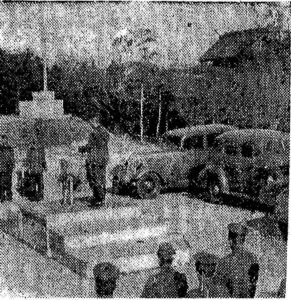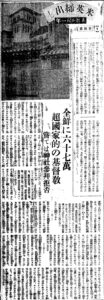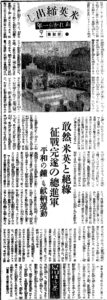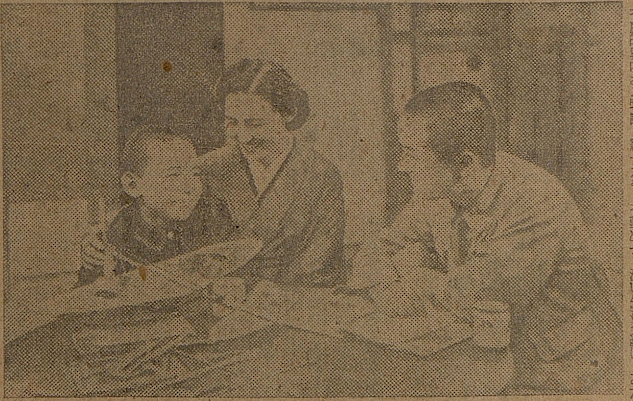Master Imaizumi Teisuke was a prominent Shinto theologian and spiritual leader of Imperial Japan. By 1942, when he went on a 12-day tour of Korea lecturing on the Imperial Way to the colonial ruling class, he was an 80-year-old man who had personally witnessed the dizzying pace of change that Japan went through from a feudal backwater in the 1860's to a sprawling empire in the course of a human lifetime. He had devoted his whole life to studying Kokugaku, which was a nativist Japanese academic movement which despised foreign thought, including Christianity, Buddhism, and Chinese philosophy, and advocated a return to Japan's ancient Shinto roots. His flowing white beard gave him the look of an ancient sage.
 |
| Imaizumi with Commander Itagaki |
He was so revered that his words were considered gospel truth by the ruling class of colonial Korea. This is why I am presenting an excerpt of the first article, in which he explains how one should conceptualize Japanese-Korean unification: as a relationship between husband and wife, and as a relationship between a horse and its rider. In the second article, he gives a radio address to the Korean people in a paternalistic manner, as though they were his children, and describes Japanese-Korean unification as a relationship between parent and child. His comments may sound ridiculous, but his teachings were seriously followed by the colonial rulers of Korea, who prominently published his abstruse speeches about Shinto philosophy over many days in the Keijo Nippo newspaper. They serve to provide us with a glimpse into the religious fundamentalist motivations that drove the colonial regime into brutally imposing State Shintoism on the Korean population. The third article is an announcement about Imaizumi which was published ahead of his tour of Korea, in which the colonial regime explains just how important Imaizumi is to their ruling philosophy.
But the strange thing is that this once heralded Imperialist philosopher is no longer celebrated among the Japanese neo-Imperialists today. His books are now out-of-print and largely forgotten, hidden in obscure corners of libraries. Why is that? Perhaps because he politically spoke out against the regime during the war? A Japanese Wikipedia article about him says that he criticized the Imperial Japanese military's political policies during the war, which led to his works being censored. However, I could not find any online primary sources backing up this statement. My long-term project will be to do some off-line research where I can to figure out what he said against the Imperial military.
Imaizumi died on September 11, 1944. However, his obituary in the Keijo Nippo newspaper from September 12, 1944 is too blurred to read. The quality of the scans of the newspapers on Internet archive are often too poor to be legible. Just one of the many illegible newspaper pages that I'm curious about, I'm hoping to one day visit the National Library of Korea in Seoul to examine a hard copy of the newspaper to see how the obituary describes Imaizumi, or wait until the National Library of Korea gets around to releasing high quality scans of all the pages of Keijo Nippo in its archives.
(Translation)
Gyeongseong Ilbo (Keijo Nippo) November 20, 1942
The True Meaning of the Imperial Way, by Imaizumi Teisuke
Generation and Development in accordance with Hakkō Ichiu
A nation of unity between the Emperor and His subjects
[…]
The Imperial Way Leading the World
[…]
In particular, the unification of the people of the Korean peninsula and the people of mainland Japan into "one body" has been preached daily for more than 30 years since the annexation of Korea. Although people often talk about "one body" today, the truth of this "one body" seems to be unclear to them. The easiest way to understand the concept of "one body" is to consider the example of a husband and wife. When the couple is seen as a man and a woman, they are counted as two people, but when they are seen as husband and wife, they are counted as "one body".
Therefore, if the husband has done something wrong, the wife is not blameless. If the woman has done something wrong, the man is not said to be without responsibility, because the husband and wife are "one body". The belief that they are two people [and not "one body"] leads to situations happening even to this day, where the husband harbors a secret and thinks that he can solve the problem by simply hiding his mistress from his wife. This is because they do not know the ethical truth of "one body". If the couple believes that they are "one body" and not two people, then there is no way that the man and the woman can keep secrets from each other. This is because it is impossible to keep secrets within "one body".
Making the leap towards becoming "one body"
Where else can one find such a thoroughgoing code of ethics as that of the Japanese people? In any other code of ethics, husband and wife are counted as two people. In the Chinese code of ethics, there is a concept of qin and se, two string instruments that play in perfect marital harmony. Whereas in China, they merely say that the couple are two string instruments that are well matched, in Japan, husband and wife are "one body". In this way, two completely different beings, both in form and spirit, become "one body". It is not a matter of combining one and one to become two. When a husband and wife become "one body", one and one multiply to become five or eight. That is the meaning that I would like you all to consider in the case of Japanese-Korean unification.
Japanese-Korean unification does not mean that one and one come together to form two. True unification into "one body" means that one and one come together to make five or eight. When you are doing some work together with a common purpose, one man and one man combine to become "one body". When two men combine to become "one body", their combined power is not that of two people, but that of five or eight people.
Here, we must carefully consider things. When we describe a master horse rider, we say, "Without someone on the saddle, there is no horse under the saddle," which means that man and horse are in harmony, but this is not a combination of one and one to form two. Neither can a horse jump alone, nor can a person run alone. However, when man and horse are in harmony, the heavenly horse can fly to the sky and travel a thousand miles.
With respect to the process of becoming "one body", similar beings can become "one body", or two completely different beings as a man and a woman can become "one body". Either way is fine, but at any rate, two beings become one. There is no doubt that the power of this union is very great. (Speech stenograph)
Source: https://www.archive.org/details/kjnp-1942-11-20
Gyeongseong Ilbo (Keijo Nippo) November 25, 1942
The "Essence of the National Body" as explained by Master Imaizumi
Master Imaizumi broadcast his message to all of Korea yesterday
After finishing his lecture tour in Pyongyang and Hamhung, Master Imaizumi arrived in Seoul by train at 2:12 p.m. on November 24th. But before he could rest his old body, he broadcast a lecture entitled "The Essence of the National Body" to all of Korea from the Seoul Broadcasting Station at 7:00 p.m. Twenty minutes earlier, he had entered the broadcasting station and sat quietly in the waiting room meditating, not even moving his body so he could practice the draft of his speech. Soon thereafter, his voice came through the microphone as if he were a compassionate father who was patiently teaching his children.
In a voice so bright and clear that it was hard to believe that he was 80 years old, he was now exhorting the 24 million people of the Korean peninsula about the incomparable essence of our national body and the Great Way of Japanese-Korean Unification. Moreover, his voice was gentle as he explained the pure and fervent national body, and each word seemed to penetrate from the ear into the heart. As he proceeded to explain the Way of the gods, that is, the Way of the Emperor, his voice finally grew passionate, and he said the following:
"In our nation, the gods have given us the Three Sacred Treasures as a spiritual gift, and the Ears of Rice as a material gift. We cannot save humanity unless we cultivate both the material and the spiritual. We cannot be saved by merely teaching spiritual salvation, as is done in other countries, because eating is an essential part of human life." He went on to describe how the Japanese way of thinking, which has continued to flow for 2600 years, and the foreign way of thinking, represented by Christianity, differ in many ways.
"The love between parents and children in Japan is unparalleled in other countries. A family cannot exist without sincere contact by both the parents and the children." He explained the superiority of the ancient Japanese family system in terms of the affection between the parents and the children, saying,
"In the Meiji Era, the people of mainland Japan and the people of the Korean peninsula were united into 'one body'. In order for both sides to be truly happy, they must be able to relate to each other with the same love and affection that real parents and their children would have. This is where the Great Way of Japanese-Korean Unification can exist."
After returning to the waiting room, the Master chatted with his attendants and wrote in flowing brush strokes the four Chinese characters "神人感應" (God and man are in harmony) in the calligraphy book provided by the staff. At 8:20 p.m., he returned to his lodgings, braving the cold wind. [Photo: Master Imaizumi during his broadcast]
 |
| Imaizumi during his radio broadcast in Korea |
Source: https://www.archive.org/details/kjnp-1942-11-25
Gyeongseong Ilbo (Keijo Nippo) November 10, 1942
Igniting the Torch of the Japanese Soul
Master Imaizumi, an authority on Kokugaku
Lecture events evangelizing the Imperial Way are fast approaching
Governor-General Koiso came to office proclaiming the "Penetration into the True Meaning of the National Body" and the "Establishment of Righteous Korea". This was the voice of heaven that cried out loudly to the 24 million people of the Korean peninsula from that day on. Only when we are committed to the true meaning of the national body and live by the Imperial Way can we become true Imperial subjects. From there, total power will be born. We can then expand our productive capacity. Righteous Korea will be brilliantly established. Be penetrated into the true meaning of the national body! Live the Imperial Way!
This must also be the direction of the movement of the newly launched Korean Federation of National Power. To further spur on this surging momentum on the peninsula, Keijo Nippo invited Master Imaizumi Teisuke, the greatest authority on Kokugaku, to give a "Great Lecture Event Evangelizing the Imperial Way" in all the major cities of Korea. The aim is to ignite the fire of the Japanese spirit in the hearts of 24 million people of Korea.
Master Imaizumi will leave Tokyo on the 15th, land in Busan on the 17th, and arrive in Seoul on the same day. He will participate at 3:00 p.m. on the 18th in the main auditorium of the Seoul Citizens Hall in order to establish a Righteous Korea. He will preach the dignity of the Imperial Way to the masses and teach them the way to grasp the Japanese spirit. On the following day on the 19th, he will speak about the Imperial Way to the ruling class as well at the Hasegawa Bank meeting hall. Departing from Seoul on the 20th, he will speak about the Great Way of the Japanese spirit with fiery speeches at Pyongyang Public Hall on the 21st, Hamhung on the 23rd, Daegu on the 25th, and Busan on the 27th.
 |
| Imaizumi arrives in Seoul |
For 12 days from his landing in Busan to his departure from Korea, this Master who is thoroughly committed to the true meaning of the national body, will travel around the Korea peninsula where the cold weather is intense, despite having an old 80-year-old body, to devote himself to the National Structure Clarification Movement for evangelizing the Imperial Way. This must be an exaltation of his spirit of martyrdom.
He was born in Shiroishi, Miyagi Prefecture, in 1863 as an Imperial subject. He studied Kokugaku at an early age and lived through the Meiji era and the Taishō era. During this time when the vast Western civilization was being praised, he never stopped advocating for the penetration into the true meaning of the national body, and for evangelizing the Imperial Way.
Ceaselessly working to make sure that the study of the national body remained true to its principles, he became absorbed in studying the literature until his eyes became bloodshot. He is not averse to discussing the national body from a scientific standpoint, but he is more concerned with discovering the "soul" that resides in our national body, which is unrivaled by any other nation, from a higher spiritual standpoint. From there, he has been developing a nationwide National Structure Clarification Movement.
The Imperial Way Society, which he presides over, counts among his great followers the Generals Araki Sadao, Hayashi Senjūrō, Yamamoto Eisuke, and Yonai Mitsumasa of the Imperial Army and Navy, Hiranuma Kiichirō and other top military leaders and both Houses of the Diet, as well as Ogura Masatsune, Kurimoto Ryūnosuke, and Tadayoshi Obata, who are leaders in the Japanese business world.
He has recently written "A Collection of Recent Essays on the Imperial Way", and he has devoted himself to evangelizing the Imperial Way and clarifying the National Structure by spending four or five days a month in the Kansai region to lecture on the true meaning of the national body to those in the business world who are said to be from the old regime.
Source: https://www.archive.org/details/kjnp-1942-11-10
(Transcription)
京城日報 1942年11月20日
皇道の本義 今泉定助
生成発展、八紘為宇
美し君臣一体の国家
[…]
世界を導く皇道
[…]
殊に半島の人々と内地の人々が一体になるということは、合邦以来三十余年、毎日のように説かれて来ている。一体ということは今日よく人が申しますけれども、一体の真理がはっきりしておらぬように思われるのであります。一番わかり易いのは夫婦の一体である。男女という時には二人に数えるけれども、夫婦にして数えるときは一体である。
それだから夫に若し悪いことがあれば妻も罪なしとは言われぬ。女の方に悪いことがあっても男も責任なしとは言われない。夫婦一体である。二人だと思うから男の秘密があっても隠し女の方も隠していて、それで済むことのように考えて今日まで来ている。一体倫理の真実が判らぬからであります。二人でない一人であるという考えを持ちましたならば、男女ともにどちらに秘密があってもどうして隠せましょう。一体の中に秘密があるというようなことはあり得ないことであります。
飛躍する一体化
日本人ほど徹底した倫理はどこにありましょう。どこの倫理だって夫婦は二人と数えている。支那の倫理などでも琴瑟相和す。琴と瑟とよく揃っているという程度以外にはいっていない。日本のは夫婦一体である。そうして形の上からいっても、精神上からいっても全然違ったものが一体になる。一と一と合せて二になるのではない。夫婦が一体になるということは五にも八にも飛ぶのである。この意味を内鮮一体の場合において私はよくお考えを願いたいと思うのであります。
内鮮一体ということは、ただ一つ一つが集まって二つになったのではない。本当の一体は五にも八にも飛躍するのであります。あなた方が平常志を同じくして何か仕事をおやりになっている際に、男と男と一体となる。男と男と二人が一体になりましたならば、その力というものは二つの力ではありません。五人力、八人力を出すのであります。
ここでよく考えなければならぬ。馬乗りの名人を形容して『鞍上人なし鞍下馬なし』というようなことを申しますのは、人と馬との意気が合った姿であるが、これは一と一とを合せて二となったのではなく、五にも八にもなって飛ぶのである。馬だけでも飛べるものでなく、人間だけで走れるものでもありません。ところが人と馬との意気が合いますと天馬空を行く。いわゆる千里を行くのであります。
この一体化、同じものでも一体になる。男女のような全然変ったものでも一体になる。それはどちらでもよろしいが、兎に角、二つのものが一体になる。その力というものは、非常なものであるということだけは疑う余地がありません。 (講演速記)
京城日報 1942年11月25日
説き示す”国体の精華”
今泉先生、さくや全鮮へ放送
平壌、咸興の講演行脚を終えた今泉先生は二十四日午後二時十二分着。列車で一先ず帰城したが、老躯を休めるいとまもなく午後七時京城放送局から全鮮へ向け、『国体の精華』と題する講演を放送した。定刻二十分前に放送局に入った先生は控室で静かに瞑想に耽り、講演の草稿を練っているが如く身じろぎもしない。やがて諄々と子供にさとす慈父の如く語る先生の声がマイクから流れて来た。
今ぞ半島二千四百万民衆へ我が国体の精華の無比なることを、内鮮一体の大道を、八十歳の老躯とも思えぬ明るく澄んだ声で喝破するのだ。しかも純烈な国体を説く先生の声はあくまでやさしく、一語一語が耳から胸へしみ透るようだ。神ながらの道、即ち天皇の道なる帰一性へ説き進んだ先生の声はようやく熱を帯び、さらに
『我が国には昔から精神的なものを救う三種の神器があると同時に物質的な”斎庭の稲穂”を神はわれわれに下し賜わった。物質と精神の両方面をつくってするのでなければ、人間を救う事は出来ない。外国のようにただ単に精神的な救いのみを教えるのでは救われるものではない。人間は喰うことも生きる上に欠くことの出来ない要素である』と滔々として二千六百年を流れつづける日本思想と、キリスト教によって代表せられる外国思想との相違点を説き衝き、
『日本の親子の愛情は他国に比を見ない。親からも子からも真心をもって接触しなければ家庭というものは存続し得ない』と日本古来の家族制度の優位性を親子の愛情の問題から説明し、
『内地人と半島人は明治の御代に合邦せられて一体となった。両者が真に幸福になるには、お互いが本当の親子のような親愛をもって睦み合わなければならない。そこにこそ内鮮一体の大道が存在し得るのである』と内鮮一体の根本となる大道を説き示し、八時放送を終った。
控室に戻った先生は側近者を相手に雑談を交わし、係員の差し出した揮毫帳に墨痕淋漓、”神人感応”の四文字を揮毫。八時二十分寒風を衝いて宿舎へ引き揚げた。【写真=放送する今泉翁】
京城日報 1942年11月10日
点ぜん、日本魂の炬火
国学の権威、今泉先生
皇道宣揚講演会迫る
『国体本義の透徹』といい『道義朝鮮の確立』といい、共に小磯総督が着任。その日から声を大にして半島二千四百万大衆に呼びかけて来た天の声である。国体本義に徹し、皇道に生きんとするときこそ我等は真の皇国臣民たり得るのだ。そこから総力は生れる。生産力の拡充が出来る。道義朝鮮は燦然と確立されるのだ。国体の本義に透徹せよ。皇道に生きよ。
新発足せる総力聯盟の運動方向もまた茲に存するに違いない。この澎湃たる半島の機運に更に拍車して本社では、わが国学の最高権威今泉定助先生を招じ、全鮮主要各地に『皇道宣揚大講演会』を開催。二千四百万民衆一人一人の胸中に惲く日本魂の火を点ぜんとするものである。
今泉先生は十五日東京出発、十七日釜山上陸、同日京城着、十八日午後三時から府民館大講堂で道義朝鮮確立を期して参ずる。大衆に対し皇道の尊厳を説き日本精神把握の道を教える。翌十九日は長谷川町銀行集会所で同様指導者層に対して皇道を語る。二十日京城発、二十一日平壌公会堂で、二十三日咸興、二十五日大邱、二十七日釜山の各公会堂で烈々火の如き講述をもって日本精神の大道を語るのである。
釜山上陸より離鮮まで十二日間、国体本義に透徹した先生が八十の老躯を厭わず寒気凛烈たらんとする半島を遍歴。皇道宣揚国体明徴運動に挺身することは、そのまま殉国精神の発揚であらねばならない。
文久三年、宮城県白石町に皇国臣民として生を享けた先生はいま年齢八十。幼にして国学を修め爾来明治、大正の両御代を生き蕩々たる西欧文明謳歌の間に敢然棹して国体本義の透徹を叫び、皇道の宣揚に寧日なかった。
先生は従来の国体論が主として史実に符節を合すことに汲々とし、文献渉猟に血眼となり、所謂科学的に国体を論ずるのに嫌がらず、更に高き精神的方面から入って万邦無比のわが国体に宿る『魂』の発見に努め、これより出でて国体明徴の運動を全国的に展開しているものである。
先生の主宰する皇道社は荒木貞夫、林銑十郎、山本英輔、米内光政各陸海軍大将、平沼騏一郎男をはじめ軍部、貴衆両院の各幹部を擁し、また日本財界の雄、小倉正恒、栗本隆之助、小畑忠良の各氏等もまた絶大なる先生の信奉者である。
『最近皇道叢書』を世に著した先生は多忙な身を割いて毎月四、五日を関西に旅し、最も旧体制といわれた財界人に国体の本義を説くなど皇道宣揚、国体明徴のため全く一死以て君国に捧げきっているのである。








